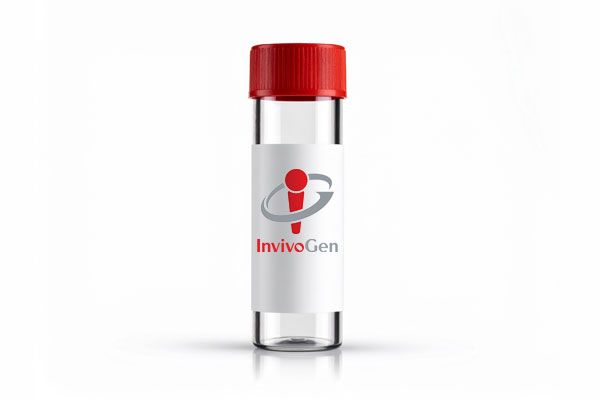3p-hpRNA
-
Cat.code:
tlrl-hprna
- Documents
ABOUT
RIG-I agonist
3p-hpRNA is a 5’ triphosphate hairpin RNA that was generated by in vitro transcription of a sequence from the influenza A (H1N1) virus, a single‑stranded negative‑sense RNA virus [1,2]. This 89-mer RNA oligonucleotide contains an uncapped 5’ triphosphate extremity and a double-strand fragment. 3p-hpRNA sequence self-anneals to form secondary structures such as hairpin or panhandle conformations. These structural features, which distinguish viral RNA from mammalian RNA, are recognized by retinoic acid-inducible gene I (RIG‑I) [3,4]. RIG-I is a cytoplasmic RNA helicase that belongs to the RIG-I-like receptors (RLRs) family and triggers an antiviral immune response by the activation of type-I interferons (IFN-α and -β)[5].
To achieve stimulation of RIG-I, 3p-hpRNA must be delivered into the cytoplasm, for example by using a transfection agent, such as LyoVec™. Of note, this ligand induces stronger RIG-I responses than 5’ppp‑dsRNA, a fully synthetic RIG-I ligand.
Key Features of 3p-hpRNA:
- 3p-hpRNA is a specific RIG-I agonist
- Stronger RIG-I responses than 5’ppp‑dsRNA
- Its biological activity has been verified using our RLR reporter cell lines.
References:
1. Rehwinkel J. et al., 2010. RIG-I detects viral genomic RNA during negative-strand RNA virus infection. Cell. 140:397-408.
2. Liu G. et al., 2015. Influenza A Virus Panhandle Structure Is Directly Involved in RIG-I Activation and IFN Induction. J Virol. 89(11):6067-79.
3. Hornung V. et al., 2006. 5’-triphosphate RNA is the ligand for RIGI. Science. 314:994-7.
4. Gebhardt A. et al., 2017. Discrimination of Self and Non-Self Ribonucleic Acids. Journal of IFN & Cytokine Research 37: 184-97.
5. Yoneyama M. et al., 2015. Viral RNA detection by RIG-I-like receptors. Curr Opin Immunol. 32:48-53.
All products are for research use only, and not for human or veterinary use.
SPECIFICATIONS
Specifications
RIG-I
5’-pppGGAGCAAAAGCAGGGUGACAAAGACAUAAUGGAUCCAAACACUGUGUCAAGCUUUCAGGUAGAUUGCUUUCUUUGGCAUGUCCGCAAAC- 3’ (89 mer)
10 ng -1 μg/ml for cellular assays
Naked
Negative (tested using EndotoxDetect™ assay)
Cellular assays
Each lot is functionally tested and validated using A549-Dual™ Cells.
CONTENTS
Contents
-
Product:3p-hpRNA
-
Cat code:tlrl-hprna
-
Quantity:25 µg
1.5 ml sterile endotoxin-free water
Shipping & Storage
- Shipping method: Room temperature
- Upon receipt, store product at -20 °C
- Avoid repeated freeze-thaw cycles
Storage:
Caution:
DOCUMENTS
Documents
Technical Data Sheet
Validation Data Sheet
Safety Data Sheet
Certificate of analysis
Need a CoA ?






